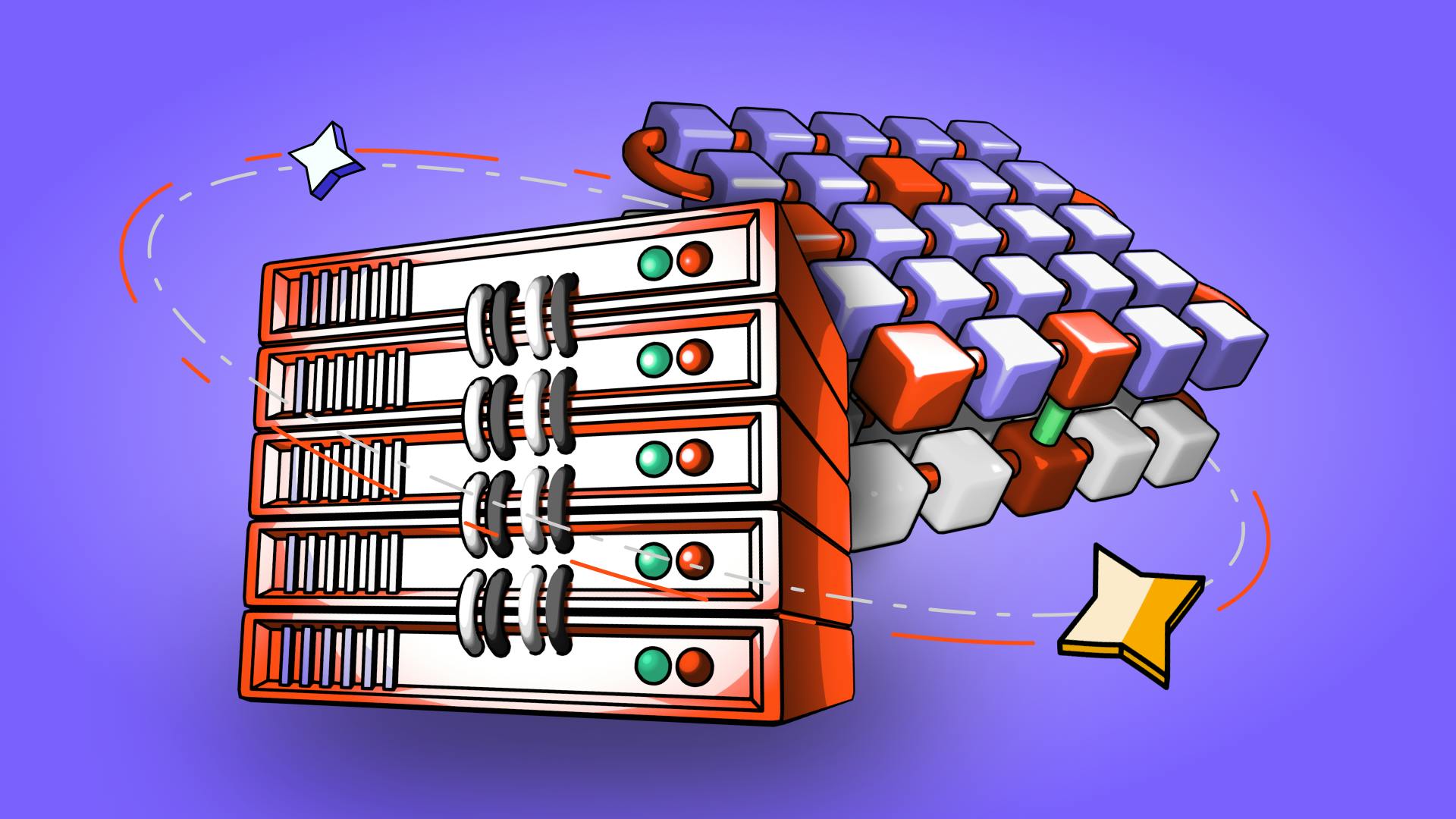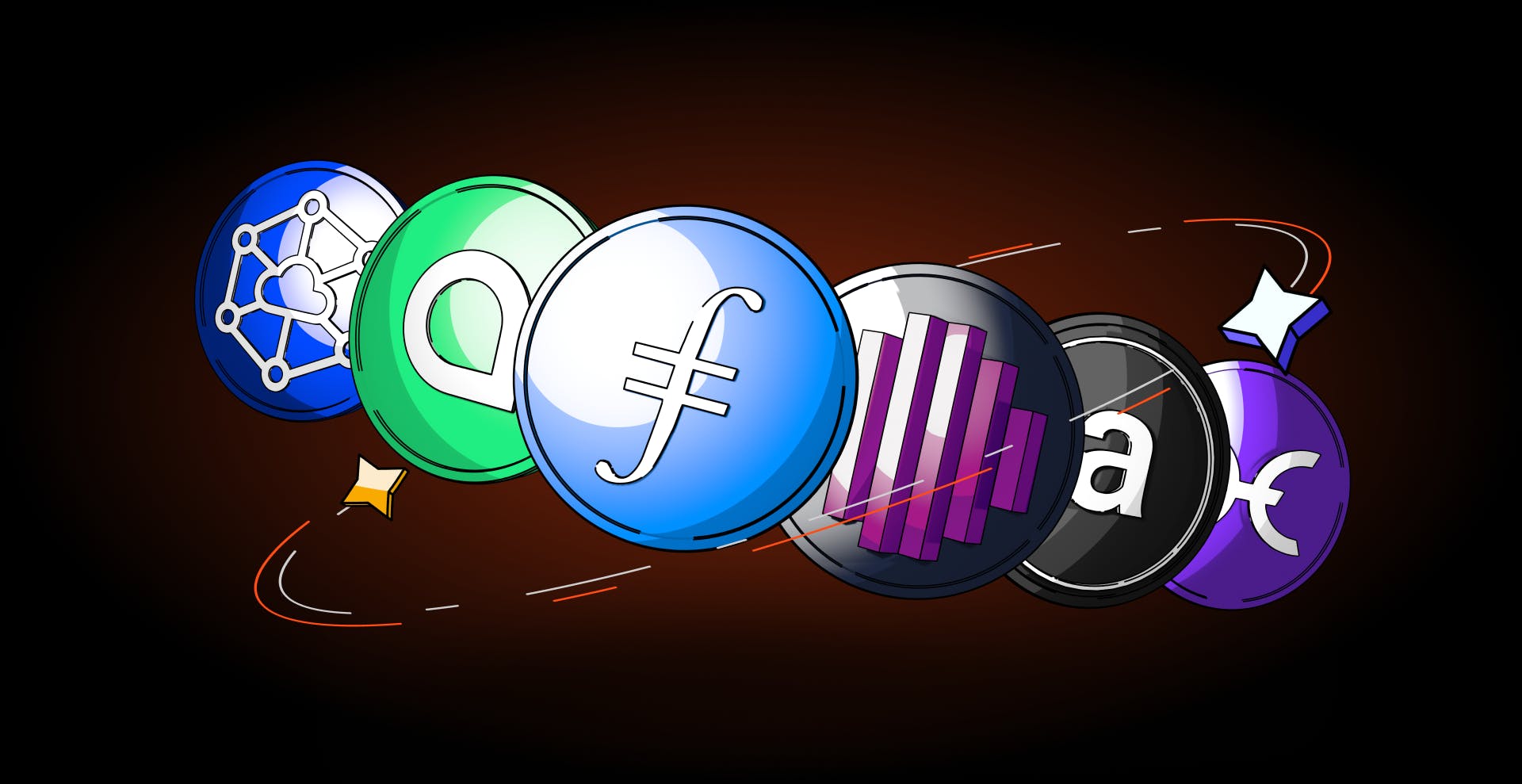El Futuro de las Soluciones Descentralizadas de Ancho de Banda y Almacenamiento
26 de agosto de 2024

by Equipo Editorial de Coinmetro
26 de agosto de 2024
La era digital ha traído un aumento explosivo en la generación de datos, aumentando la necesidad de soluciones de gestión de datos más seguras, escalables y eficientes. Sin embargo, los sistemas centralizados de ancho de banda y almacenamiento presentan desafíos significativos. Las brechas de datos se han vuelto alarmantemente comunes, los altos costos sobrecargan a las empresas y la centralización corre el riesgo de concentrar el poder entre unos pocos gigantes tecnológicos, lo que podría llevar a monopolios potenciales.
A medida que crece la demanda de gestión de datos, las limitaciones de los sistemas centralizados se han vuelto más evidentes. Estos sistemas a menudo tienen problemas de escalabilidad, confiando en puntos únicos de falla que pueden comprometer la seguridad y la fiabilidad. Además, la concentración de datos en manos de unas pocas entidades genera preocupaciones sobre la privacidad y el control, ya que los usuarios tienen poca voz sobre cómo se almacenan y usan sus datos.
Este artículo explora el panorama emergente de las soluciones descentralizadas de ancho de banda y almacenamiento, que ofrecen una alternativa prometedora a los métodos tradicionales. Estas tecnologías innovadoras tienen el potencial de revolucionar la manera en que gestionamos y almacenamos datos, proporcionando mayor seguridad, rentabilidad y control del usuario. Al aprovechar las redes descentralizadas, estas soluciones pueden distribuir datos en múltiples nodos, reduciendo la dependencia de servidores centrales y mitigando los riesgos asociados con la centralización.
Exploraremos la mecánica del ancho de banda y almacenamiento descentralizados, examinaremos sus ventajas y discutiremos sus desafíos. También hablaremos sobre aplicaciones del mundo real y posibles desarrollos futuros, ofreciendo una visión completa de lo que nos espera en este campo transformador. Aprenderá sobre:
- Ancho de banda y almacenamiento descentralizados
- Ventajas de las soluciones descentralizadas
- Aplicaciones y casos de uso del mundo real
- Desafíos
- Si desea obtener más información sobre proyectos específicos de almacenamiento descentralizado, leaeste artículo.
Las soluciones descentralizadas de ancho de banda y almacenamiento representan un cambio de los sistemas tradicionales centralizados a un modelo donde los datos y recursos se distribuyen en múltiples nodos en una red. A diferencia de los sistemas centralizados, donde una sola entidad controla el almacenamiento de datos y la distribución del ancho de banda, los sistemas descentralizados utilizan blockchain, redes peer-to-peer (P2P) y libros contables distribuidos para dispersar los datos en muchos nodos independientes. Este enfoque reduce la dependencia de servidores centrales y mitiga los riesgos asociados con la centralización, como las brechas de datos, la censura y los puntos únicos de falla.
En una red descentralizada, los datos se almacenan y gestionan a través de muchos nodos en lugar de mantenerse en una sola ubicación. Estos nodos podrían ser computadoras individuales, servidores o incluso dispositivos conectados a la red. Cada nodo tiene una porción de los datos, y el sistema asegura que los datos permanezcan accesibles y seguros a través de redundancia y encriptación.
Por ejemplo, la tecnología blockchain sustenta muchas redes descentralizadas al mantener un libro contable transparente e inmutable de transacciones o cambios de datos. Las redes peer-to-peer permiten la comunicación directa entre nodos, permitiendo un intercambio y recuperación de datos eficiente sin intermediarios. Esta estructura asegura que ninguna entidad única controle la red, mejorando la seguridad y la resiliencia.
Varios proyectos están liderando el camino en soluciones descentralizadas de ancho de banda y almacenamiento.
Filecoin: Un mercado de almacenamiento en la nube de código abierto, protocolo y criptomoneda que incentiva a los usuarios a alquilar espacio de almacenamiento adicional. Permite a los usuarios almacenar y recuperar datos de manera descentralizada.
Storj (STORJ): Una red de almacenamiento en la nube descentralizada que encripta y distribuye datos a través de una red global de nodos, proporcionando altos niveles de seguridad y redundancia.
Sia (SC): Sia ofrece almacenamiento en la nube descentralizado dividiendo, encriptando y distribuyendo archivos a través de una red global descentralizada. Su objetivo es reducir costos y aumentar la privacidad en comparación con los servicios tradicionales de almacenamiento en la nube.
Holo (HOT): Holochain permite el alojamiento descentralizado de aplicaciones en una red peer-to-peer, que no se limita al almacenamiento sino que también cubre el ancho de banda y la potencia de cómputo. Holo ofrece un enfoque único facilitando una nube distribuida que los usuarios poseen y operan.
Las soluciones descentralizadas mejoran significativamente la seguridad de los datos al aprovechar el cifrado y las redes distribuidas. En estos sistemas, los datos se dividen en piezas y se almacenan en múltiples nodos, lo que hace extremadamente difícil para los actores malintencionados acceder o comprometer todo el conjunto de datos. Incluso si un nodo es violado, los datos permanecen seguros porque están cifrados y dispersos en diferentes ubicaciones. Esta naturaleza distribuida de las redes descentralizadas reduce el riesgo de violaciones de datos a gran escala, que son más comunes en los sistemas centralizados donde un solo punto de falla puede exponer grandes cantidades de información.
Los sistemas descentralizados ofrecen potenciales ahorros de costos al eliminar intermediarios y utilizar recursos infrautilizados. Los sistemas centralizados tradicionales a menudo implican intermediarios que cobran tarifas por gestionar y almacenar datos. Las redes descentralizadas, por otro lado, permiten interacciones peer-to-peer, eliminando estos intermediarios y reduciendo los costos generales. Además, las redes descentralizadas pueden aprovechar el almacenamiento y el ancho de banda no utilizados de los usuarios individuales, creando una asignación de recursos más eficiente. Esto reduce los costos operativos y democratiza el acceso al almacenamiento de datos y al ancho de banda.
Las soluciones descentralizadas son inherentemente escalables y pueden ampliarse fácilmente para satisfacer las crecientes demandas de datos. Las infraestructuras centralizadas tradicionales a menudo tienen problemas con la escalabilidad, requiriendo una inversión significativa en nuevo hardware e infraestructura. En cambio, las redes descentralizadas pueden escalar simplemente añadiendo más nodos. Esta escalabilidad no está limitada por la ubicación geográfica o el control centralizado, lo que hace que las soluciones descentralizadas sean ideales para aplicaciones globales. A medida que aumenta la demanda, la red puede crecer orgánicamente, asegurando un rendimiento constante sin sobrecargas masivas de infraestructura.
Una de las ventajas más convincentes de las soluciones descentralizadas es el empoderamiento de los usuarios para controlar y poseer sus datos. En los sistemas centralizados, los usuarios a menudo renuncian al control de sus datos a proveedores de servicios de terceros, quienes pueden monetizarlos o usarlos indebidamente sin su consentimiento. Los sistemas descentralizados, sin embargo, permiten a los usuarios mantener la propiedad total de sus datos. Ellos deciden cómo, dónde y con quién se comparten sus datos. Este cambio hacia un control de datos centrado en el usuario mejora la privacidad y genera confianza en los sistemas digitales. Las soluciones descentralizadas fomentan una mayor transparencia y responsabilidad al eliminar la necesidad de confiar en una autoridad central.
Las soluciones de ancho de banda descentralizadas pueden revolucionar potencialmente las Redes de Distribución de Contenido (CDNs). Las CDNs tradicionales dependen de una red centralizada de servidores para distribuir contenido a los usuarios, lo cual puede ser costoso y puede tener problemas de escalabilidad a medida que aumenta la demanda. Las CDNs descentralizadas distribuyen la carga a través de una red peer-to-peer, donde múltiples nodos pueden compartir recursos de ancho de banda y almacenamiento. Este método reduce la dependencia de un servidor central, disminuye costos y mejora el rendimiento, particularmente en regiones con infraestructura pobre. Al aprovechar el ancho de banda descentralizado, las CDNs pueden proporcionar una entrega de contenido más rápida, reducir la latencia y ofrecer un servicio más robusto incluso durante picos de tráfico.
Las empresas y los individuos recurren cada vez más al almacenamiento en la nube descentralizado como una alternativa segura y rentable a las soluciones de almacenamiento tradicionales. A diferencia de los servicios en la nube convencionales, las plataformas de almacenamiento descentralizado distribuyen los datos a través de una red global de nodos, asegurando la redundancia y seguridad mediante encriptación. Por ejemplo, plataformas como Storj y Sia permiten a los usuarios alquilar espacio de almacenamiento sobrante, creando una red distribuida donde los datos se almacenan de manera segura en múltiples ubicaciones. Estudios de caso han demostrado que el almacenamiento descentralizado reduce costos y mejora la privacidad de los datos, ya que ninguna entidad única controla la información. Este enfoque es particularmente beneficioso para las industrias que manejan información sensible, como la salud y las finanzas.
Las industrias de medios y entretenimiento pueden beneficiarse significativamente de las soluciones de ancho de banda descentralizadas. La transmisión de video y los juegos en línea, que requieren un alto ancho de banda y baja latencia, pueden aprovechar las redes descentralizadas para mejorar la experiencia del usuario. Los sistemas centralizados tradicionales a menudo tienen problemas de búfer y retraso durante los periodos de alto tráfico, pero las redes descentralizadas distribuyen la carga entre múltiples nodos, reduciendo estos problemas. Por ejemplo, proyectos como Theta Network buscan mejorar la calidad de la transmisión permitiendo que los usuarios compartan su ancho de banda y ganen tokens. Este modelo descentralizado mejora el rendimiento de los servicios de transmisión y ofrece nuevas fuentes de ingresos para los usuarios.
El almacenamiento y el ancho de banda descentralizados permiten a las empresas almacenar grandes volúmenes de datos sin depender de proveedores centralizados que podrían ser vulnerables a ataques o interrupciones. Además, las soluciones descentralizadas suelen ofrecer una mejor escalabilidad, permitiendo a las empresas ajustar sus necesidades de almacenamiento y ancho de banda a medida que crecen con facilidad. Por ejemplo, las industrias que requieren disponibilidad constante y tiempo de actividad, como los servicios financieros o el comercio electrónico, pueden beneficiarse de la resiliencia de las redes descentralizadas. Al adoptar estas tecnologías, las empresas pueden lograr una mayor seguridad, menores costos y más flexibilidad en la gestión de sus datos.

Las soluciones descentralizadas de ancho de banda y almacenamiento enfrentan importantes barreras de adopción. Un obstáculo importante es la falta general de conciencia y comprensión entre los posibles usuarios. Muchos individuos y empresas no están familiarizados con el funcionamiento de estas tecnologías ni con sus beneficios en comparación con las soluciones centralizadas tradicionales. Además, la complejidad técnica de configurar y mantener redes descentralizadas puede ser desalentadora para usuarios que no son técnicamente inclinados. Esta complejidad a menudo requiere conocimientos especializados, lo que limita la adopción generalizada. Además, la incertidumbre regulatoria crea vacilación, ya que los gobiernos no han establecido directrices o políticas claras respecto a las tecnologías descentralizadas. Esta incertidumbre puede disuadir a las empresas de invertir en estas soluciones, temiendo posibles repercusiones legales.
Las redes descentralizadas también pueden enfrentar varios desafíos técnicos. Uno de los problemas más apremiantes es la latencia y la velocidad de recuperación de datos. En una red descentralizada, los datos se almacenan en múltiples nodos, los cuales pueden estar geográficamente dispersos. Esta distribución puede llevar a tiempos de recuperación de datos más lentos en comparación con los sistemas centralizados que almacenan los datos en un solo lugar. Además, asegurar una disponibilidad de datos consistente a lo largo de una red descentralizada puede ser un desafío. Si muchos nodos se desconectan o no mantienen su parte de la red, la accesibilidad a los datos puede sufrir, lo que lleva a posibles tiempos de inactividad o pérdida de datos.
Los gobiernos de todo el mundo aún están tratando de encontrar la manera de regular las tecnologías descentralizadas. Esta incertidumbre crea un entorno desafiante para las empresas y los desarrolladores que trabajan con soluciones descentralizadas de ancho de banda y almacenamiento. En algunas regiones, existe el riesgo de que los gobiernos impongan regulaciones estrictas o prohibiciones totales, particularmente si perciben estas tecnologías como amenazas al control centralizado o a las leyes de protección de datos existentes. Por otro lado, la falta de regulación también puede ser problemática, llevando al posible uso indebido de las redes descentralizadas para actividades ilegales. El debate en curso sobre cómo regular los sistemas descentralizados impacta en su crecimiento y adopción, ya que las empresas siguen siendo cautelosas respecto a operar en un espacio legalmente ambiguo.
La interoperabilidad es otro desafío significativo para las redes descentralizadas. Para que estas soluciones sean verdaderamente efectivas, diferentes redes descentralizadas deben poder trabajar juntas sin problemas. Sin embargo, la falta de protocolos estandarizados a través de varias redes hace que la interoperabilidad sea difícil. Cada red podría usar diferentes tecnologías, métodos de cifrado o formatos de datos, obstaculizando su comunicación e intercambio de datos. Sin estándares comunes, los usuarios pueden encontrar desafíos para mover datos entre redes o integrar múltiples soluciones descentralizadas en un sistema coherente. Esta fragmentación podría limitar la efectividad general y la adopción de tecnologías descentralizadas.
El futuro de las soluciones descentralizadas de ancho de banda y almacenamiento tiene una promesa significativa para reformar cómo gestionamos los datos en la era digital. Estas tecnologías ofrecen una mayor seguridad, escalabilidad y eficiencia de costos, haciéndolas cada vez más atractivas para empresas y particulares. A medida que aumenta la adopción, la descentralización de la gestión de datos probablemente se volverá más común, impulsada por la necesidad de un mejor control, privacidad y resistencia contra los riesgos de centralización.
Sin embargo, como con la mayoría de los desarrollos de blockchain, deben abordarse desafíos como las incertidumbres regulatorias, las complejidades técnicas y la interoperabilidad para realizar todo el potencial de estas soluciones. El desarrollo continuo de protocolos estandarizados y marcos regulatorios más claros jugará un papel crucial en superar estos obstáculos.
En resumen, las soluciones descentralizadas representan un cambio transformador en el almacenamiento, la gestión y el acceso a los datos. A medida que estas tecnologías evolucionen y maduren, están posicionadas para convertirse en la piedra angular de una infraestructura digital más segura, eficiente y controlada por el usuario. El camino por delante requerirá colaboración, innovación y adaptabilidad, pero las recompensas potenciales son inmensas para aquellos que abracen este nuevo paradigma.
¿Qué tokens de proyectos de almacenamiento y ancho de banda descentralizado tienes en tu portafolio?
Compra Storj (STORJ), Holo (HOT) y más de 90 otras criptomonedas en el intercambio Coinmetro y aprende más sobre proyectos específicos de almacenamiento descentralizado en este artículo.
Únete a la comunidad de Coinmetro en Discord y Telegram, donde traders e inversores visionarios se reúnen para compartir ideas, explorar nuevas oportunidades y profundizar en las criptomonedas. Si necesitas ayuda, por favor contacta a nuestro equipo de soporte al cliente de clase mundial a través de chat en vivo 24/7 o por correo electrónico en hello@coinmetro.com.
Para convertirte en usuario de Coinmetro hoy,Regístrate ahora o dirígete a nuestra nueva plataforma de intercambio si ya estás registrado para experimentar nuestra plataforma de trading premium.
Etiquetas
Artículos relacionados

Blockchain en la educación: transformando el aprendizaje y la acreditación
¿Qué pasaría si tu expediente académico pudiera verificarse al instante, en cualquier lugar del mundo? Esta es solo una de las preguntas que reflejan…
7m

Cómo comprar Ethereum (ETH) en Coinmetro - paso a paso
¿Quieres comprar Ethereum al instante sin complicaciones? Coinmetro lo hace rápido, sencillo y seguro. Esta guía te muestra los pasos simples para…
3m

Cómo hacer staking de Ethereum (ETH) en Coinmetro de forma rápida, sencilla y segura
¿Quieres ganar ingresos pasivos con tu Ethereum? Con Coinmetro, hacer staking de ETH es un proceso fluido, seguro y fácil para principiantes. En esta…
3m

El papel de la cadena de bloques en la trazabilidad de la cadena de suministro
En 2021, un escándalo sacudió al sector alimentario. Varios proveedores habían etiquetado carne caducada como si fuera fresca. El resultado fue la…
11m